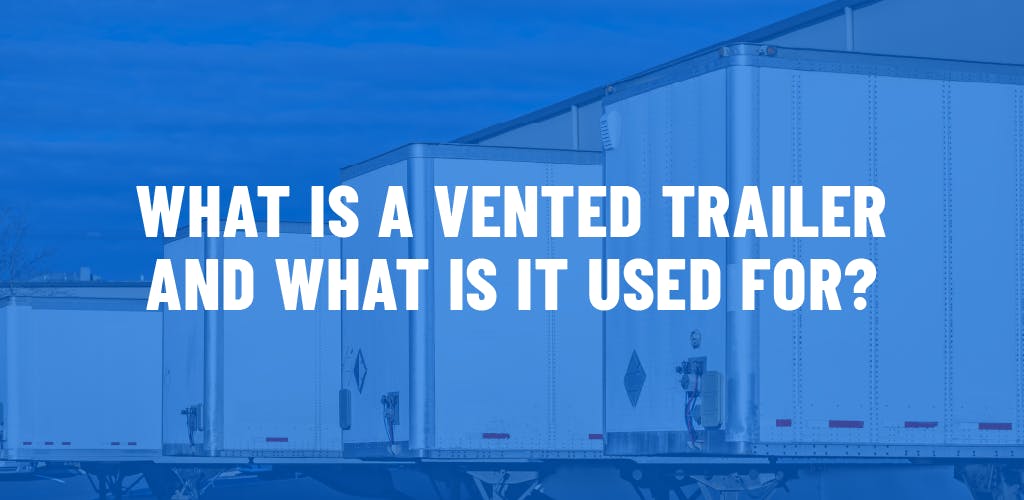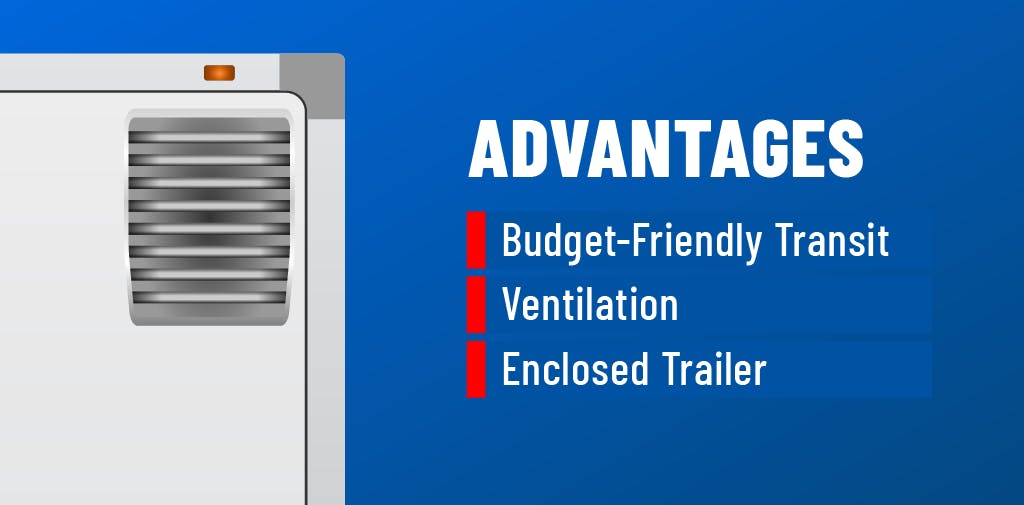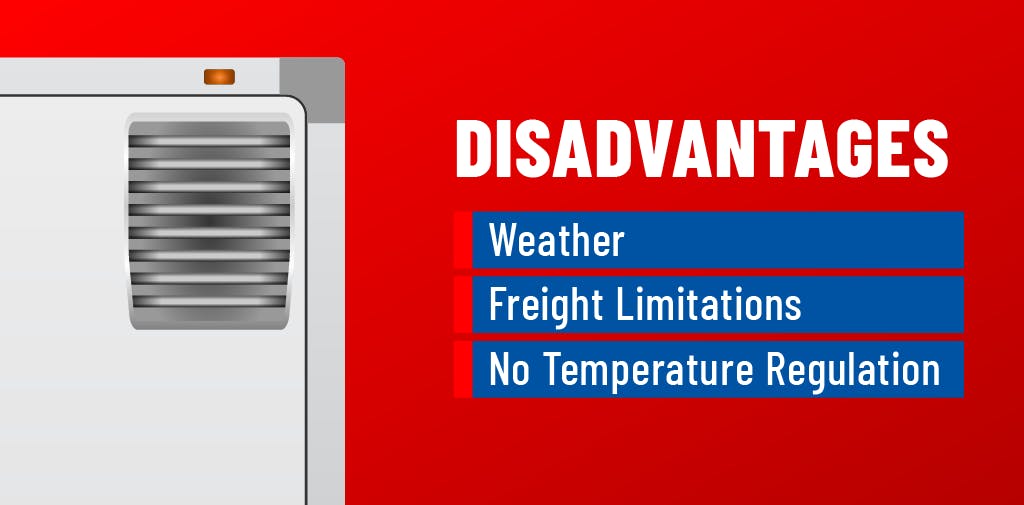What is a Vented Van Trailer and What is it Used For?
March 23rd, 2023

The trucking industry is quickly expanding with semi-trailers available for both commercial and residential use. Although their features are similar, there are some subtle differences, such as the case with vented dry van trailers. Allow us to give insight on why vented van trailers are a game-changer for delivering temperature-sensitive goods.
What is a Vented Trailer?
A vented vans trailer has vents in the back and front of the trailer to allow for air passage. Because of the airflow, vented trailers may transport goods that would normally require a reefer truck.
The vents can be opened or closed, which is useful when it is raining or snowing. It’s important to note that the goods inside may be harmed due to moisture.
Features of a Vented Trailer
So, what makes a vented trailer different from other trailers? The main distinction is the air circulation within the trailer. A vented van trailer has vents at the front and back of the trailer to promote airflow. For things that require air circulation but not a strictly temperature-controlled environment. This is an efficient alternative to using a reefer, for goods that will allow it.
The vents in these trailers might also vary. Some vents resemble little doors that can be closed to protect against moisture damage from outside. Other vents, on the other hand, resemble normal air conditioning and heating vents, consisting of a metal plate with slits.
What Are Vented Van Trailers Used For?
The best use for these trailers is when you have to transport goods that might be sensitive to moisture or heat. Vented vans can help prevent overheating while still allowing items to breathe.
Some general goods you can haul using a vented van trailer include:
- Corn
- Onion
- Potatoes
- Pumpkins
- Plastics (if needing ventilation after leaving manufacturing)
- Watermelons
- Wine bottles
The Importance of Vented Van Trailers
When you are looking to transport your goods, it is important that you ensure that they are well-protected. One of the best ways to do this is by using a vented van trailer.
The vented design also makes it easier for you to load and unload your items into the trailer by allowing you access from both sides of the vehicle. A refrigerated unit offers something similar, but at a higher price point. This vented trailers are much more affordable.
Advantages and Drawbacks of Using a Vented Van Trailer
The issue with a standard van is that, while it is good for dry items and electronics, many products, such as fresh fruit or produce, need to breathe while still being sheltered from direct sunlight. Vented van trailers offer this and are distinguished from slat-sided trailers by their small vents.
Let’s look at some of the advantages and drawbacks when using a vented van trailer.
Advantages

Some advantages of vented van trailers include:
- Budget-Friendly Transit: In the summer months, many need refrigerated units for goods that needs to be fairly temperature regulated. However, in other seasons, a vented trailer can be used to save money as long as the weather permits.
- Ventilation: One of the key benefits of a vented van trailer is its ability to keep cargo aired out and relatively cool from the container and vent features. Vents help to limit the amount of heat produced inside trailers, which is especially important for goods like onions which can emit strong fumes in hot weather.
- Enclosed trailer: Being cover, the freight has security from external elements, giving the shipper and driver greater confidence.
Disadvantages

Some disadvantages of vented van trailers include:
- Weather: If it gets too cold or too hot, there are certain damages to cargo that can take place. It could be spoilage of foods or interfering with the sensitivity of electronics. The vents may not be enough to regulate conditions to combat this.
- Freight Limitations: A vented dry van trailer can haul heavy cargo but not oversized cargo. You may need a different shipping vehicle that will likely cost more.
- No Temperature Regulation: While the temperature may be cooler and the goods are ventilated, there is no full guarantee the goods will be at a regulated temperature during transit.
Are Vented Van Trailers Right for Me?
Looking for a mode of transportation for goods that aren’t as temperature sensitive? Consider a vented trailer as a transportation method for the things you need shipped.
A vented dry van trailer will save you money and allow you to send a range of things. If this sounds like your usual shipments, then give vented van trailers a try. You can test out if this is a good method for you by renting a dry van trailer for an upcoming delivery.
Frequently Asked Questions
What maintenance is required for a vented van trailer?
Other than usual truck maintenance, keep a close eye on the seals around the vent doors and their openings. Make sure that it’s clean and operable so you can easily open and close the vent as needed.
How does a vented van trailer provide ventilation?
A vented van trailer is designed to provide ventilation by channeling air into the trailer through the roof. This air is directed through vents in the roof, which are connected to an system that draws out hot air from inside the trailer.
How does a vented van trailer compare to a refrigerated trailer?
A vented van trailer is essentially a refrigerated trailer minus the refrigeration unit and insulation. Perishable goods work well in a temperature-controlled environment which a refrigerated trailer can offer but not a vented trailer. However, depending on the weather a vented van can be a good alternative to cut down on your budget for transport.
Select the Newest Member of Your Fleet from Hale Trailer
If you need a vented van trailer or another style of vehicle for your shipment, Hale Trailer can help. We have new and used dry van trailers for sale for you to expand your fleet. Catch our trailer inventory in motion, which includes rental options. Browse our selections online or visit one of our locations to learn more about how we can help you.
All the information on this website – https://www.haletrailer.com – is published in good faith and for general information purposes only. Hale Trailer Brake and Wheel does not make any warranties about the completeness, reliability and accuracy of this information. Any action you take upon the information you find on this website, is strictly at your own risk. Hale Trailer Brake and Wheel will not be liable for any losses and/or damages in connection with the use of our website.
